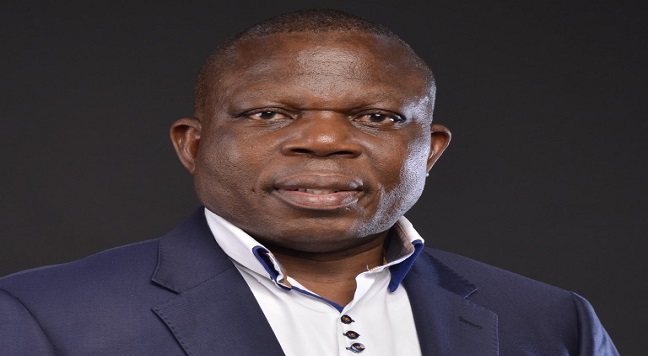News
Osun Trains 20,000 Youths on ICT

Osun State Government said it has engaged several youths in productive venture through its various empowerment programmes, especially, the training of about 20,000 indigenes in Information Communication Technology, ICT.
This was revealed over the weekend during a briefing by Mr. Abiodun Fesobi, Project coordinator of Osun Youths Empowerment Scheme Technology (OYESTECH), in Osogbo, the Osun state capital.
According to him, the programme is designed as an exit plan for OYES volunteers in the state and also to serve as support base for other interested participants to be self-reliant.
He hinted that the objective of the programme is to impact participants with required skill which will enable them to be employable by any organisation and become business owners.
“OYESTECH is an information and Communication Technology branch of the widely accepted Osun Youth Empowerment Scheme, OYES which is aimed at impacting the participants with required skills so as to enable them employable and become business owners.
“The scheme is all about skill acquisition through knowledge transfer with 10 training centres across the state which gives training on various sections such as phone repairs, electronics computer assembling, computer usage and entrepreneurship.
Aside 5,000 participants trained in the first batch of the scheme, additional 15,000 have been trained in different aspect of applied technology and they also re-trained many others.
He said, “Some of our graduates have also gone ahead to train over 150 persons; with success stories in their businesses.
“In order to achieve this set objectives, the government, through its investment arm- Osun State Investment Company Limited, OSICOL- embarked on selection of technical partner- RLG- and through signing of memorandum of understanding and admission of 5000 trainees per batch in four batches and at the end of it certificate were issued to participants.
In separate interviews, the beneficiaries said that the programme has enhanced their living condition and that of their families by making them productive and enable them to give back to the society.
One of the beneficiaries identified as Oseni Ibrahim, said, “I am one of the beneficiaries of the OYESTECH, the government have tried by giving us the best and also sending us to Ghana for training. We were trained on information technology and at our return; government equipped us with necessary tools which we are all satisfied with.
Another beneficiary who is now Mr. Abdul-Hakeem Babatunde, Director of Bayotek Computer Service, relaying his experience, said, “Bayotek computer service was founded after I graduated from the Osun Youth Empowerment Scheme Technology in 2011 and we were given a mandate to empower other youths so as to complement government’s efforts at reducing unemployment among the youth.
“I have one of my centres at Federal Polytechnic Ede, Osun State and also have a Cybercafe as an extension where I also train students on how to work on software and hardware of computers. I have trained over 100 youths.
Also speaking, Anthonia Ogundare lauded the state government for the opportunity given her and many others to be part of the scheme adding that the scheme has made youths in the state productive.
“I have been a beneficiary of this programme; I was privileged to be chosen among 150 beneficiaries who were sponsored to Ghana by Osun state government for a month internship and at our return I was employed and I have since been working at Adulawo Technology City in Ilesa.
“This is one programme that has helped the youths in securing jobs to help their family and future. I have been learning a lot and gaining more knowledge every day”.
It would be recalled that the scheme which is aimed at job creation through ICT was inaugurated by the state governor, Ogbeni Rauf Aregbesola, in 2011.
OYESTECH is one of the components of Osun Youth Empowerment Scheme (OYES) which has recruited over 40,000 youths.
The programme now in its sixth year, has successfully scaled down youths unemployment and profitably engaged them in various areas of ICT.
Also, the United Nations in its latest Global multi-dimensional poverty index report on Nigeria ranked the state of Osun as the 2nd state after Lagos with least poverty amongst the 36 states in Nigeria.
This is due to the several empowerment programmes of the government which has successfully moved hundreds of thousands away from the poverty line.
News
New Horizons Invests N50m to Empower Almajiris with Skills

New Horizons Nigeria has launched a N50 million initiative aimed at transforming 21 Almajiri children into skilled computer technicians within 90 days, to tackle youth unemployment and harness human potential.

The Almajiri-to-Tech programme, officially launched in Abuja on Monday, provides participants with full training, meals, clothing, tools, and logistics support, all fully funded.
Speaking at the launch, the Chief Executive Officer of New Horizons, Tim Akano, said the programme represents a new journey in the history of Nigeria by restoring the original purpose of the Almajiri system, which he described as “children sent out to seek knowledge.”
“The word Almajiri comes from an Arabic term meaning emigrant and seeker of knowledge. Historically, children were sent to learn morals, responsibility, and skills to add value to society,” Akano said.
He added that the disruption of this system during colonial times forced many children onto the streets, a challenge that persists today.
Akano highlighted the urgency of addressing the Almajiri issue, noting that there are an estimated 15 million Almajiris in the country, with a population growth rate of around three per cent annually.
“If we do not solve this problem as a country, we are sitting on a time bomb,” he warned.
According to him, the programme focuses on hands-on technical skills rather than theory. Trainees will learn to repair mobile phones, laptops, televisions, radios, standing fans, and other electronic devices, as well as build inverter batteries using recycled electronic waste.
“We are not teaching theory. We are teaching practical skills you can use to earn a living,” Akano said, stressing that the programme will not interfere with the participants’ Quranic education.
“We are still going to allow you, within the period of learning. Your learning computer here is not stopping your Quranic education.
“You still have time within our space here. Whenever you want to go and pray, you can pray, then come back to class,” the CEO stressed.
He added that participants will also receive daily meals, water, T-shirts identifying them as technicians-in-training, and access to all necessary tools and equipment throughout the 90-day programme.
Akano said the initiative is part of a larger mission by New Horizons Nigeria, which has spent the past 21 years training about 100,000 Nigerians annually in IT and related skills.
He said the new programme aims to “take human genius off the streets and convert it into human capital, enabling these youths to contribute meaningfully to the economy.”
He added that equipping Almajiris with skills could add 15 million people to Nigeria’s workforce and potentially increase the country’s GDP by as much as $20 billion, stressing that productivity depends on practical skills and opportunity.
“Everything that can be taught can be learned. If someone can memorize the Quran cover to cover, there is nothing that cannot be done. What they lack is information, opportunity, and infrastructure, and we are providing all of that,” Akano said.
Akano also stressed that the initiative is designed to inspire other organizations and government agencies to replicate similar programmes across the country.
“This is not just about 21 children; it is about showing Nigeria what is possible when resources meet intention and planning.
“If we succeed in empowering these Almajiris, we demonstrate that the country can turn social challenges into economic opportunities. It’s a blueprint for Nigeria’s future,” he said, noting that the initiative combines social reform, technical education, and economic empowerment.
Also speaking, one of the trainees, Fatima Umar, appreciated the organisers and promised to maximise the opportunity.
“We’ll make you proud of us. We have nothing to say here but to thank and appreciate you. May Almighty Allah continue to guide and protect you,” Umar said.
News
IMF Upgrades Nigeria’s 2026 Growth Projection to 4.4%

International Monetary Fund has upgraded Nigeria’s 2026 economic growth projection to 4.4 per cent, reflecting improved macroeconomic stability and sustained reforms.

IMF
The January 2026 World Economic Outlook Update forecasts Nigeria’s growth trajectory at 4.1 per cent in 2024, 4.2 per cent in 2025, and 4.4 per cent in 2026—a 0.2 percentage point increase from the October 2025 estimate.
This aligns with sub-Saharan Africa’s projected 4.6 per cent expansion in 2026 and 2027, driven by regional stabilisation efforts.
Globally, the IMF anticipates 3.3 per cent growth amid resilient conditions tempered by trade policy shifts and technology investments. For Nigeria, declining energy prices—expected to fall seven per cent due to weak demand—pose risks, though OPEC+ coordination and China’s stockpiling provide support.
Despite the optimism, downside risks persist from Middle East and Ukraine tensions, protectionism, high debt, and fiscal deficits. The Fund recommends rebuilding fiscal buffers, ensuring central bank independence, and limiting temporary fiscal measures to maintain stability.
Nigeria’s success hinges on consistent reforms and resilience against domestic and global shocks, the IMF concluded.
News
Nigeria’s Crude Output Falls to 1.486mbpd in November – OPEC

Organisation of Petroleum Exporting Countries (OPEC) reports that Nigeria’s crude oil production, excluding condensate, dropped by 0.7 per cent to 1.486 million barrels per day (mbpd) in November 2025 from 1.496 mbpd in October.

OPEC
The figure, drawn from secondary sources in OPEC’s December 2025 Monthly Oil Market Report, fell short of Nigeria’s 1.5 mbpd quota. Direct communication data showed output at 1.436 mbpd, up from October’s 1.401 mbpd, but still below target.
Nigeria produces around 196,028 bpd of condensate, excluded from quota calculations per Nigerian Upstream Petroleum Regulatory Commission figures. Year-on-year, November’s output marked a slight gain over 1.417 mbpd in November 2024.
Expert Cites Insecurity, Governance Gaps
Petroleum economics expert Wumi Iledare described the quota miss as unsurprising, blaming persistent insecurity, an ageing oil basin lacking new finds, and unoffered hydrocarbon blocks. Governance shortcomings and policy uncertainty further erode investor confidence, he noted.
Selective implementation of the Petroleum Industry Act worsens the situation, with Nigeria needing a single authoritative leader for the sector rather than multiple proxies, Mr Iledare stressed. The country has struggled to consistently hit OPEC targets for years.

 E-Financial2 days ago
E-Financial2 days agoHere Are Nigerian Banks That Have Secured Their Licences

 Telecom2 days ago
Telecom2 days agoMTN CEO Toriola Hails Nigeria’s Telecom Transformation at MIPAD

 E-Financial2 days ago
E-Financial2 days agoZenith Bank Top Nigerian Bank Pick Ahead of GTCO, AccessCorp

 News2 days ago
News2 days agoICPC Charges Ozekhome with Forgery, Corruption Over London Property

 E-Financial2 days ago
E-Financial2 days agoNigeria Processed $92.1Bn Crypto Transactions in 12 Months — PwC

 E-Financial2 days ago
E-Financial2 days agoHow Crypto Criminals Stole $700m from People – often Using Age-Old Tricks

 Telecom2 days ago
Telecom2 days agoLebara Launches Agent Registration Portal

 E-Business2 days ago
E-Business2 days agoElon Musk Seeks $134Bn from OpenAI, Microsoft for ‘Wrongful Gains’


























